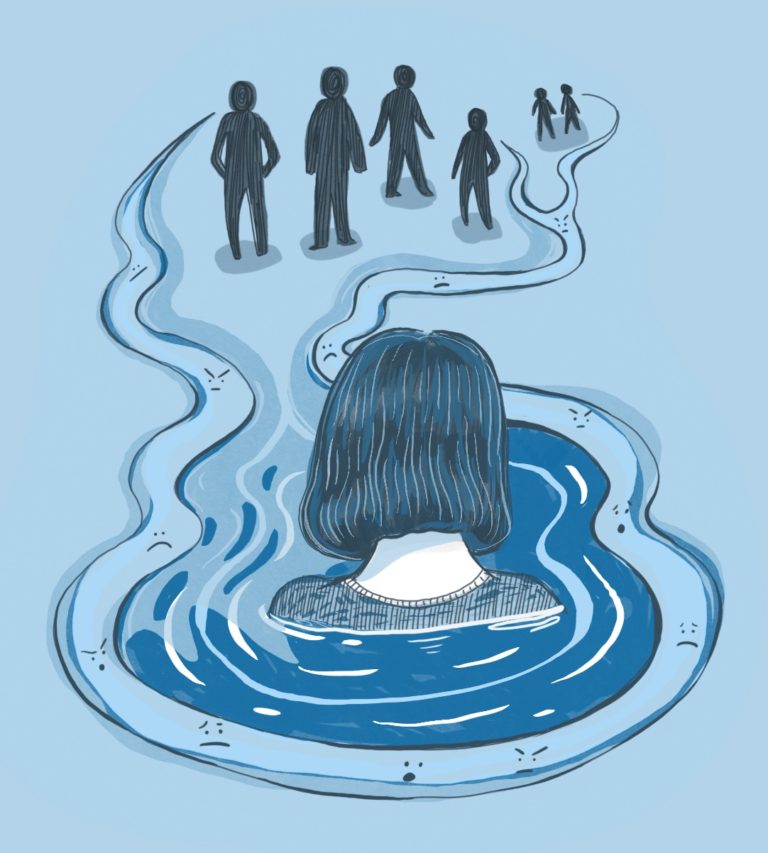
Ethan Yu
Contributing Writer
From unavoidable racist jokes on Facebook and Twitter to uncomfortable stares at the supermarket, xenophobic affronts have become the new normal for many Asian Americans. On April 23, the UCSB MultiCultural Center (MCC) along with UCSB faculty and students hosted a virtual workshop to address the recent racism against local and global Asian communities during the COVID-19 pandemic.
This event was the first in a planned series of virtual discussions on forms of political action during the pandemic, and it started off with a large turnout of over 130 people. Despite the difficulties of maintaining a dialogue via Zoom, the event created a safe, open space for people to freely speak their minds on recent xenophobia.
Many people in the Zoom chat raised concerns about the Trump administration’s aggressive naming of COVID-19 as the “Wuhan” or “Chinese Virus,” the future of relations between the Asian and Black, Indigenous, and People of Color (BIPOC) communities, and the numerous microaggressions Asian Americans and Pacific Islanders (AAPI) encounter daily.
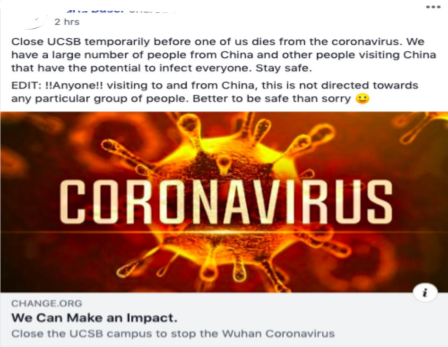
Rose Hoang, a third-year global studies and Asian American studies double major, began by showing numerous posts from the UCSB Free & For Sale Facebook group that exemplified the kind of xenophobia and microaggressions Asian students have been facing at UCSB since mid-to-late January.
One post from January linked a petition to shut UCSB down because of the high amount of Chinese international students while others made inappropriate jokes like offering cheap rideshares to Wuhan, China. It is also hard to forget the xenophobic treatment many international students faced for wearing masks on campus, despite the fact that face masks have been proven to decrease the spread of COVID-19.
These individual acts reflect a larger issue in the way the UC administration as a whole permits and normalizes racism and xenophobia within our communities. It was only last January when UC Berkeley released a flyer stating that “xenophobia [and] fears about interacting with those who might be from Asia” are “normal reactions.” Hoang in particular called out Chancellor Yang and the UCSB administration for failing to address the many needs and concerns of international students since last quarter.
While it’s shocking for many people to see such blatant anti-Asian sentiments within university settings, the panelists explained how this pandemic is a cold reminder that racism as a whole in our country is a complicated narrative that intersects with all races, genders, and classes throughout American history.
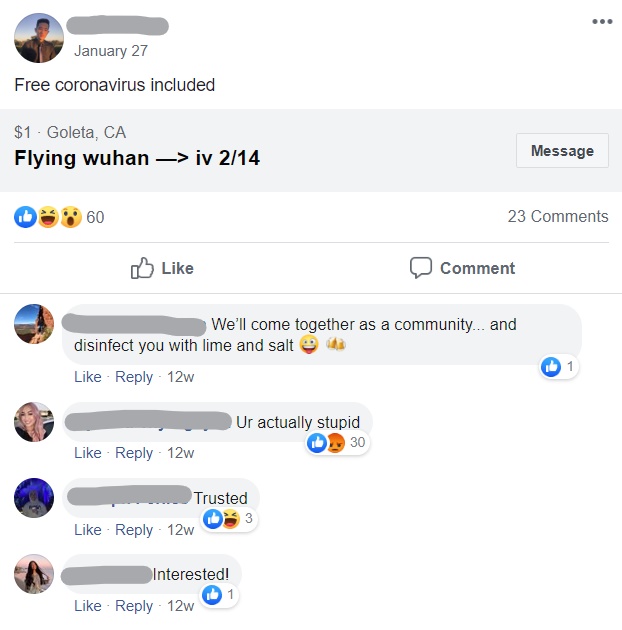
Dr. Charmaine Chua, an assistant professor in the global studies department, explained how the narrative of “anti-Asian pathogen racism” follows three classic scripts: the fear of the invading foreigner, the anxiety of the enemy within, and the preoccupation with the pure, white body.
Jason Oliver Chang, a history professor at UC Berkeley, emphasizes that these scripts aren’t new; they are only modern renditions of “Yellow Perilism,” the systematic othering of Asian American bodies to continue their political and economic exploitation.
Dr. Chua continued by pointing out two major misconceptions within our popular discourse: the naming of the “Chinese Virus” and the orientalization of Asian food. When public officials blame the virus on Chinese people or their “exotic” culture, they support white supremacist ideologies that privilege certain cultural customs over others, making Western culture the normative standard.
To discuss the governmental issues of the Chinese Communist Party (CCP) or the need for hygiene and sanitation regulation in wet markets is important, but racist remarks calling COVID-19 “Kung Flu,” as one White House official did in front of an Asian American reporter, or calling Chinese people disgusting for eating uncommon animals, is nonconstructive.
Dr. Diane Fujino, an Asian American studies professor at UCSB, stressed that calling out racism is necessary, but what is more crucial to stopping injustice and discrimination is attacking the structural bases that permit mass inequality and that have been established since the inception of America.
From the passing of the 1882 Chinese Exclusion Act to the medical gazing of Asian Americans living in Chinatowns as vectors of disease during the 19th and 20th century, this kind of treatment towards Asian Americans isn’t new nor special. Rather, it reflects how the hegemonic order can easily flip the narrative of the “model minority” and the “Yellow Peril” on marginalized groups so quickly.
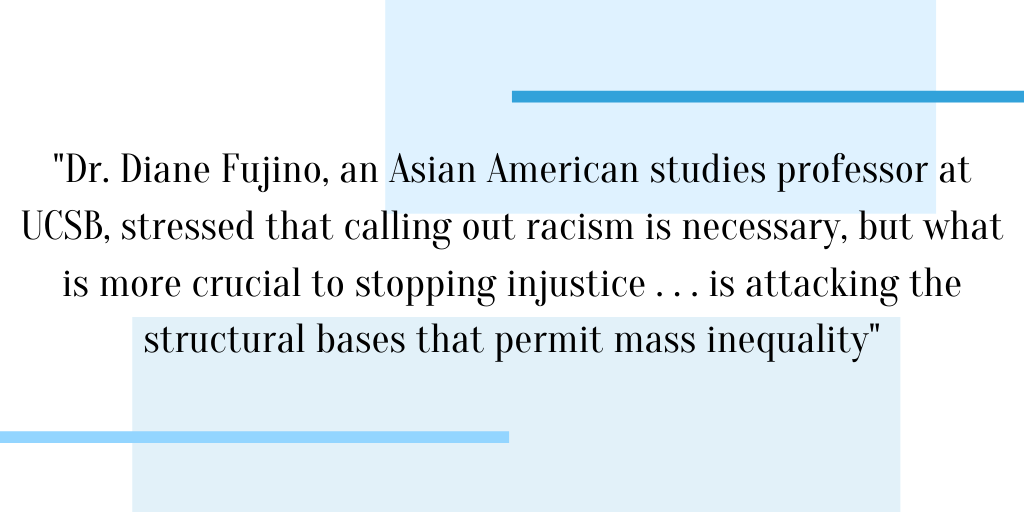
What are we supposed to take away from all this? In the midst of COVID-19 the call for mutual solidarity between white, Black, Asian, Latinx, and POC is greater than ever.
“It is time for us to be on the front-lines of fighting racism against all groups,” said Dr. Fujino.
Not too long ago, democratic presidential candidate Andrew Yang said that Asian Americans need to wear their “red, white, and blue.” But Dr. Chua disagrees.
“The onus is not on us,” says Dr. Chua. Asian Americans should not feel that they have to prove their “patriotism” when the U.S. establishment has for so many years “pursued racist legislation” against its own people, she says. Rather, it is the duty of all Americans to stand up against bigotry out of mutual care, not self-interest.
Dr. Chua ended by echoing Naomi Klein’s deconstruction of “Capitalism and Freedom” by Milton Friedman, turning his words on their neoliberal head, and promising a glimmer of social hope: “Only a crisis … produces real change … [The goal of the activist is] to keep [the struggle for justice] alive and available until the politically impossible becomes the politically inevitable.”
More information on events like this available on the MCC’s Facebook page: https://www.facebook.com/ucsbmcc/. Resources can be found in the following links: Asian Resource Center & MCC.

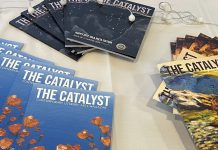


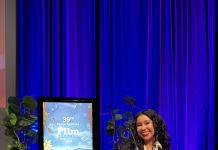


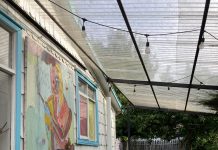
Thanks for finally talking about >UCSB MultiCultural Center Hosts Workshop
on Racism Against Asan Communities During COVID-19 | The Bottom Linee <Liked it!
Hi Lyndon,
Thanks for taking time to read my piece. The issue of As Am racism during covid is something that can never be talked about too much and certainly needs more voices from the As Am community to speak up
Comments are closed.